Iraq's Mosul shows signs of recovering after 2 years of IS defeat
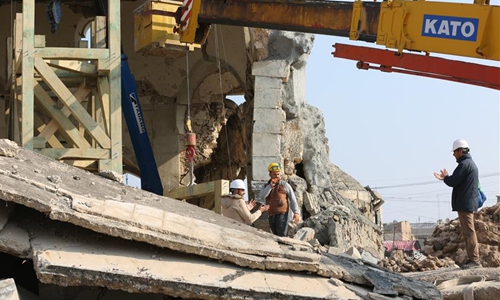
Workers reconstruct the Al-Nouri Mosque in the old city of Mosul, Iraq, Dec. 4, 2019. After two years since Iraq announced full liberation from the Islamic State (IS) militant group, Mosul, the second largest metropolis of Iraq, is showing signs of recovering. (Xinhua/Khalil Dawood)
After two years since Iraq announced full liberation from the Islamic State (IS) militant group, Mosul, the second largest metropolis of Iraq, is showing signs of recovering.
The residents of the city have strong hope for bringing normal life to their beloved city, as many of them have returned to rebuild their houses and shops.
Life restoration is running faster these days, as teams of workers can be seen almost everywhere rushing through piles of rubble in the narrow alleys to rebuild the walls of some houses and shops of the old city center in the western side of Mosul, which witnessed one of the fiercest battles since World War II.
IS extremists holed up in the narrow alleys of Mosul's Old City center, where they booby-trapped buildings and planted a large number of roadside bombs.
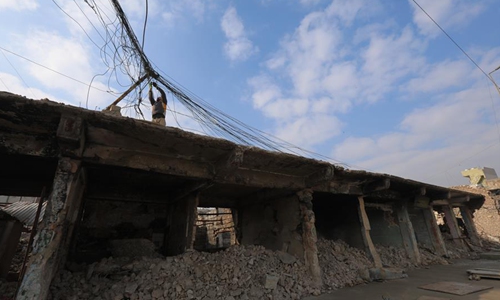
An electrician fixes electrical wires in the old city of Mosul, Iraq, Dec. 4, 2019. After two years since Iraq announced full liberation from the Islamic State (IS) militant group, Mosul, the second largest metropolis of Iraq, is showing signs of recovering. (Xinhua/Khalil Dawood)
The battles killed thousands of innocent people, with dozens of thousands of buildings damaged or destroyed, including the iconic al-Nuri Mosque and its leaning minaret.
The residents of Mosul are increasingly taking part in building their houses and old markets, while the local government is doing its best to reconstruct the city's infrastructure and main public services.
The reconstruction process is promising for the people of the city, as the process is effectively supported by some UN-funded organizations, NGOs and other private companies.
In a tour in some neighborhoods and roads in the old city center, many streets were well-paved with asphalt and its traditional markets are reviving gradually.
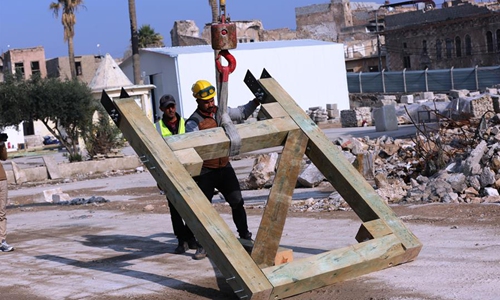
Workers reconstruct the Al-Nouri Mosque in the old city of Mosul, Iraq, Dec. 4, 2019. After two years since Iraq announced full liberation from the Islamic State (IS) militant group, Mosul, the second largest metropolis of Iraq, is showing signs of recovering. (Xinhua/Khalil Dawood)
The reconstruction also reached the ancient al-Nuri mosque, which was destroyed in the middle of 2017 during battles to dislodge IS militants from the old city center.
The UNESCO, funded by the United Arab Emirates (UAE), brought many experts, engineers and workers, to rebuild the ancient Great Mosque of al-Nuri and its famous leaning minaret, which gave the city its nickname "al-Hadbaa," or "the hunchback."
Imad Nizar, a young construction engineer, along with dozens of workers, were motivated to remove hundreds of tons of debirs from dozens of badly destroyed houses inside narrow alleys in the old city center.
Nizar and his team of workers are hired by a private company which has a contract with a UN organization to remove debris from 145 damaged houses to prepare them for another company to reconstruct the houses.
"We are supposed to remove debris from 145 houses, but we (all workers) have agreed to prepare even 200 houses for reconstruction because we really want to help more families, even if without being paid," Nizar said.
"We are exerting all our efforts to accomplish the work before the deadline in order to heal the wounds of our people in the city, which have suffered a lot because of the extremist IS group, as well as the neglect of the Iraqi government," Nizar added.
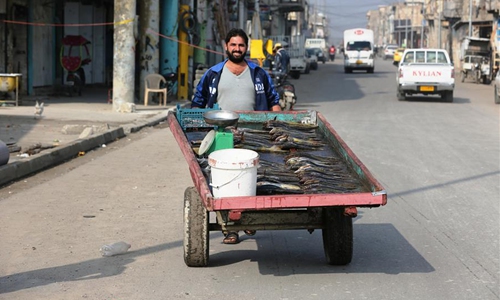
A fish seller is seen in the old city of Mosul, Iraq, Dec. 4, 2019. After two years since Iraq announced full liberation from the Islamic State (IS) militant group, Mosul, the second largest metropolis of Iraq, is showing signs of recovering. (Xinhua/Khalil Dawood)
Like many other traumatized people in Mosul, Bilal Abdullah, a taxi driver, said that he is yearning to see normality returning to his city, and he blamed the Iraqi government and the provincial government for the slow reconstruction process in Mosul.
"The provincial government's steps to rebuild the city will continue slowly because there are no signs of getting rid of the routine to rebuild the city and there are no serious efforts so far to curb the corruption," Abdullah said.
"We need the provincial government to work hard, just like the international organizations and some NGOs. I give all my respect for these organizations, especially the UN, which has a clear footprint in what was rebuilt in Mosul," Abdullah added.
As for the security situation, Abdullah said that "no comparison between the security situation now to the situation under IS group. I can drive my taxi even late at night and people are moving everywhere without fear."
For his part, Ali al-Jubouri, commander of an army regiment in Mosul, told Xinhua that the situation in Nineveh province is stable, including its capital Mosul.
"The Iraqi forces are chasing remnants of IS ... and we have made great successes in capturing many of them thanks to cooperation between people of Nineveh and our forces," al-Jubouri said.
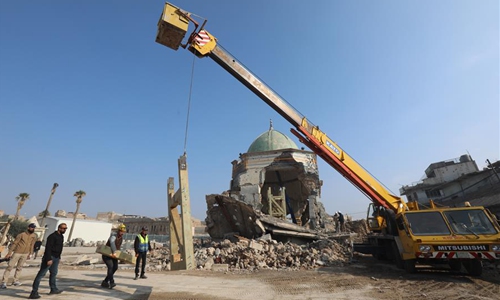
Workers reconstruct the Al-Nouri Mosque in the old city of Mosul, Iraq, Dec. 4, 2019. After two years since Iraq announced full liberation from the Islamic State (IS) militant group, Mosul, the second largest metropolis of Iraq, is showing signs of recovering. (Xinhua/Khalil Dawood)
According to al-Jubouri, the army forces have minimized their presence inside the main cities across the province and are focusing on chasing IS militants in the desert and rural areas.
Mosul, located about 400 km north of the capital Baghdad, was seized by the extremist IS militant group in June 2014.
On July 10, 2017, the Iraqi government army recovered the heavily populated city after nearly nine months of fierce fighting and heavy bombardment.
The devastation in Mosul ranged from 10 percent in some areas to 100 percent in other places like the Old City center, where some 11,500 buildings were destroyed, according to the provincial government's figures.
However, Nineveh's new governor Najim al-Jubouri said in his speech, during the Nineveh Investment Forum in Erbil, that although there is a lack in financial allocations for the province, but the stable security situation in the province, allowed many foreign humanitarian organizations and the United Nations to operate in Mosul.
"The allocations by the federal government in the annual budgets are not enough for the reconstruction of Nineveh, as it (allocation of recent budget) does not exceed 1 million U.S. dollars," the governor said during the forum which was held from Dec. 3 to 5 in Erbil, the capital of Iraq's Kurdistan semi-autonomous region.
Amer al-Obaidi, a security expert and a retired Iraqi army's Maj. Gen., told Xinhua that the recovering of the liberated areas, including Mosul, needs sustainable security and calm.
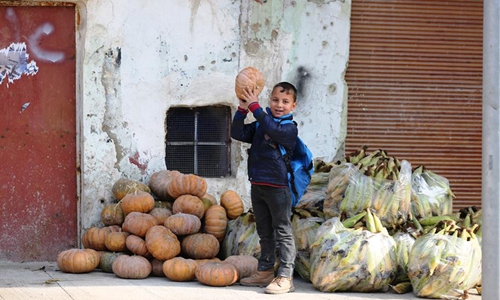
A child holds a pumpkin in the old city of Mosul, Iraq, Dec. 4, 2019. After two years since Iraq announced full liberation from the Islamic State (IS) militant group, Mosul, the second largest metropolis of Iraq, is showing signs of recovering. (Xinhua/Khalil Dawood)
Iraq has made great efforts in fighting terrorism and has declared that IS was dislodged from its last territorial foothold in Iraq in Dec. 9, 2017, giving hope for better future in the liberated areas, making Iraq, the Middle East and the world a better place to live, according to al-Obaidi.
Al-Obaidi urged the Iraqi government, international organizations and NGOs to accelerate the reconstruction of the liberated cities so normality can return and the remaining displaced people can return to their homes.
Moreover, al-Obaidi believes that "the reconstruction and the hope for a better future need calm to prevent the re-emergence of IS group, which requires avoiding new conflicts in either Iraq or Syria that would disrupt counter-IS efforts.
"The Iraqis and Syrians need a period of calm to pursue IS militants and achieve stability in their countries," the expert added.